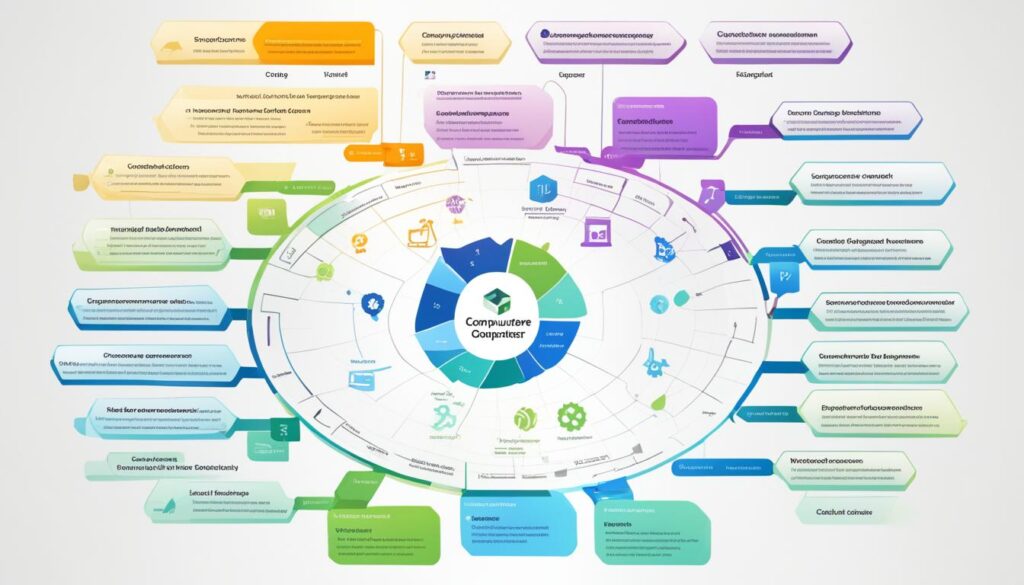
Getting a Doctor of Philosophy (PhD) in computer science is a big step. It takes you deep into the latest tech, research, and innovation. You’ll find a detailed course that includes many computer science topics. This guide will show you what a PhD in computer science is like. It covers the programme’s structure, main subjects, research ways, and the many job options after you finish.
The PhD in Computer Science programme is a long journey, lasting 3 to 5 years. It is split into semesters, with exams every year. By the end, you’ll be ready for many careers, like in banking, IT, education, research, and architecture.
Computer science is key in both schools and companies. The PhD programme mixes theory with real-world skills. You’ll learn about computer architecture, data structures, algorithms, and more.
This mix helps you think deeply and use advanced data analysis tools. You’ll study topics like wireless networks and database systems. This prepares you for the fast-changing tech world.

During your PhD, you’ll work on projects, join seminars, and work with industry experts. This makes you a skilled professional in computer science.
The PhD in Computer Science programme lasts 3 to 5 years. It’s split into semesters, with exams each year to check your progress. You’ll study both theory and practical work. This includes core subjects and electives based on what interests you.
This programme aims to finish in 36 months full-time or 72 months part-time. But, the time can change based on your research and university rules.
The PhD in Computer Science covers a lot of ground. It usually has:
You’ll have different ways to learn, like classes, labs, research, and maybe teaching. This makes sure you’re well-prepared.

Getting a PhD in Computer Science means diving deep into its key areas. You’ll learn about computer architecture and operating systems. You’ll also study advanced algorithms and data structures. These subjects are the basics of a PhD in Computer Science.
At the core of a computer is its architecture and the software that runs it. PhD students learn about computer organisation and how microprocessors work. They also learn about memory management and operating systems. This knowledge helps them solve big system problems and make computers work better.
Algorithms and data structures are key to Computer Science. PhD students learn about designing and analysing algorithms. They also learn how to manage complex data structures. This knowledge lets them solve big problems and innovate in their research.
Knowing how to design and use programming languages and compilers is vital for PhD students. They study language design and how compilation works. This skill helps them improve programming and make new software.
By studying these core subjects, PhD students in Computer Science prepare for their research. They get the tools and knowledge to advance the field.
Getting a PhD in Computer Science means you’ll explore many interesting areas. You’ll get to study things like Machine Learning and Artificial Intelligence. You’ll also learn about Computer Networks and Cybersecurity.
Your PhD will focus a lot on machine learning and artificial intelligence. You’ll learn about how computers can learn from data and make smart choices. You’ll study things like neural networks, deep learning, and how computers understand language.
Another big part of your PhD will be computer networks and cybersecurity. You’ll look into how computers talk to each other and how to keep them safe from hackers. You’ll learn about things like secret codes, how networks work, and testing how secure a system is.
By learning these special subjects, you’ll be ready to do important research and make big discoveries. This will help shape the future of computer science and technology. You’ll have many career choices, from teaching to working in tech, where you can really make a difference.
The PhD in Computer Science programme has many elective subjects and specialisations. Students can choose to focus on their interests and career goals. Two exciting areas are Bioinformatics and Computational Biology, and Computer Vision and Robotics.
For those who love combining computer science with life sciences, Bioinformatics and Computational Biology is great. It uses computer science to solve complex life science problems. This includes genomics, proteomics, and systems biology.
Students learn about things like biological sequence analysis and structural bioinformatics. They also cover computational systems biology.
Computer Vision and Robotics is for those into visual perception and smart systems. The course covers image and video processing, pattern recognition, and robotic control systems. Students work on building autonomous systems and new computer vision techniques.
These are just two examples of the many electives in a PhD in Computer Science programme. By picking their courses and research topics, students can become experts in their chosen fields.
Specialization | Key Topics |
Bioinformatics and Computational Biology |
|
Computer Vision and Robotics |
|
The PhD in Computer Science programme focuses on both theory and practice. It covers topics like research methods, computer architecture, and programming languages. This broad curriculum helps students gain the skills needed for deep research and advancing the field.
Learning how to do research well is key in the PhD in Computer Science. Students learn to plan research, analyse data, and make solid conclusions. This training helps them solve complex problems and find new insights in computer science.
The thesis is the main goal of the PhD. It shows a student’s ability to add to the field. Students work closely with their supervisors on the thesis, doing lots of research and analysis.
Then, they defend their thesis to experts. This is where they share their findings and explain their conclusions. It proves they can do independent research in computer science.
During the PhD, students work with top experts and join exciting projects. They also share their work at big conferences. This helps them improve their skills and think critically, which is key for a career in academia or the tech world.The PhD in Computer Science is a journey that prepares students to lead in their field. By learning research methods and finishing a thesis, graduates are ready to make big impacts in computer science.
The PhD in Computer Science programme at top universities focuses on both theory and practice. It includes subjects like research methods, computer architecture, and programming languages. Students learn through classes, labs, and projects to understand computer science deeply.
Classes offer detailed lectures, group talks, and teamwork. Students do assignments and solve problems to use what they’ve learned. They also get hands-on experience in labs with computer science tools and hardware.
Research projects and internships are key parts of the programme. Students work with experts on projects in computer networks, data mining, and software development. These projects help students improve their analytical and problem-solving skills.
Many students also get internships at tech companies or research places. This gives them real-world experience and a chance to use their knowledge.
This mix of theory, practice, and research makes PhD in Computer Science students experts. They shape the future of computer science and technology.
Getting a PhD in Computer Science opens up many exciting career paths. By the end of your studies, you’ll be ready for a variety of industries. These include banking, IT, education, and research.
A PhD in Computer Science gives you deep knowledge in new technologies and research methods. This makes you very valuable to employers who want to innovate and push computer science forward. You can work in software development, data analysis, cybersecurity, or artificial intelligence.
Also, a PhD in Computer Science prepares you for a career in teaching. Many graduates become professors, lecturers, and research scientists. They help the next generation of computer science experts by teaching, mentoring, and doing research.
PhD graduates in Computer Science earn a lot. In the US, they can make between £81,000 and £154,000 a year. The average salary is £113,180. Computer system engineers earn a median of £88,270, or £44.20 an hour.
In India, the job prospects are good too. Senior developers earn about £10.12 lakhs a year. Senior architects make around £23.93 lakhs. PhD holders can also find jobs in academia, like being a senior professor for £3.04 lakhs a year.
A PhD in Computer Science gives you the skills and knowledge for many rewarding careers. You can work in industry, academia, or both. Your degree leads to a future with intellectual challenges, professional growth, and many opportunities.
Getting a Doctor of Philosophy (PhD) in Computer Science is a big deal. It opens doors to exciting research and career chances. Students can pick from many top universities in India and around the world for their PhD in this fast-moving field.
India has many universities with great PhD programmes in Computer Science. Some top places include:
Many top universities around the world offer great PhD programmes in Computer Science. They draw in the best researchers and students. Some of the best places include:
Getting a PhD in Computer Science is a rewarding journey, no matter where you study. It lets students make big contributions to technology and innovation.
The PhD in Computer Science is a journey that changes you. It gives you deep knowledge, research skills, and practical expertise. You’ll learn about computer architecture, algorithms, and programming languages. You’ll also explore special areas like machine learning, cybersecurity, and data mining.
By getting a PhD in Computer Science, you’ll understand the latest technologies and research methods. You’ll also improve your critical thinking and problem-solving skills. These skills are key for success in academia, industry, or starting your own business.
Whether you want to be a famous professor, a leading researcher, or a top tech leader, this degree is your ticket. It opens doors to many exciting career paths.
Starting this journey? Think about the support you’ll get at places like the MIT Academy of Engineering (MITAOE). It’s known for its top-notch education, modern facilities, and lively research scene. MITAOE is dedicated to helping the next generation of computer science experts. They offer the guidance, tools, and chances you need to make your dreams come true.
View all
September 15, 2025 | by Ananad Madhavan